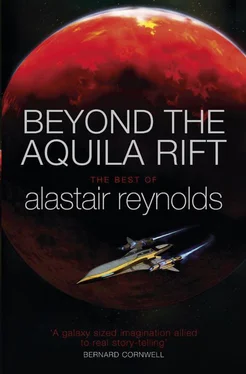“So that gives him a right to edge us closer to another war?” The way Voi spoke, it was as if her own side had not been neutral in the last exchange. But Clavain knew she was right. If hostilities between the Conjoiners and the Coalition re-ignited, the Demarchy would not be able to stand aside as they had fifteen years ago. And it was anyone’s guess how they would align themselves.
“There won’t be war.”
“And if you can’t reason with Galiana? Or are you going to play on your personal connection?”
“I was just her prisoner, that’s all.” Clavain took the controls—Voi said piloting was a bore—and unlatched the shuttle from Deimos. They dropped away at a tangent to the rotation of the equatorial ring which girdled the moon, instantly in free-fall. Clavain sketched a porthole in the wall with his fingertip, outlining a rectangle which instantly became transparent.
For a moment he saw his reflection in the glass: older than he felt he had any right to look, the grey beard and hair making him look ancient rather than patriarchal; a man deeply wearied by recent circumstance. With some relief he darkened the cabin so that he could see Deimos, dwindling at surprising speed. The higher of the two Martian moons was a dark, bristling lump, infested with armaments, belted by the bright, window-studded band of the moving ring. For the last nine years, Deimos was all that he had known, but now he could encompass it within the arc of his fist.
“Not just her prisoner,” Voi said. “No one else came back sane from the Conjoiners. She never even tried to infect you with her machines.”
“No, she didn’t. But only because the timing was on my side.” Clavain was reciting an old argument now; as much for his own benefit as Voi’s. “I was the only prisoner she had. She was losing the war by then; one more recruit to her side wouldn’t have made any real difference. The terms of cease-fire were being thrashed out and she knew she could buy herself favours by releasing me unharmed. There was something else, too. Conjoiners weren’t supposed to be capable of anything so primitive as mercy. They were spiders, as far as we were concerned. Galiana’s act threw a wrench into our thinking. It divided alliances within high command. If she hadn’t released me, they might well have nuked her out of existence.”
“So there was absolutely nothing personal?”
“No,” Clavain said. “There was nothing personal about it at all.”
Voi nodded, without in any way suggesting that she actually believed him. It was a skill some women had honed to perfection, Clavain thought.
Of course, he respected Voi completely. She had been one of the first human beings to enter Europa’s ocean, decades back. Now they were planning fabulous cities under the ice; efforts which she had spearheaded. Demarchist society was supposedly flat in structure, non-hierarchical; but someone of Voi’s brilliance ascended through echelons of her own making. She had been instrumental in brokering the peace between the Conjoiners and Clavain’s own Coalition. That was why she was coming along now: Galiana had only agreed to Clavain’s mission provided he was accompanied by a neutral observer, and Voi had been the obvious choice. Respect was easy. Trust, however, was harder: it required that Clavain ignore the fact that, with her head dotted with implants, the Demarchist woman’s condition was not very far removed from that of the enemy.
The descent to Mars was hard and steep.
Once or twice they were queried by the automated tracking systems of the satellite interdiction network. Dark weapons hovering in Mars-synchronous orbit above the nest locked onto the ship for a few instants, magnetic railguns powering up, before the shuttle’s diplomatic nature was established and it was allowed to proceed. The Interdiction was very efficient; as well it might be, given that Clavain had designed much of it himself. In fifteen years no ship had entered or left the Martian atmosphere, nor had any surface vehicle ever escaped from Galiana’s nest.
“There she is,” Clavain said, as the Great Wall rose over the horizon.
“Why do you call ‘it’ a ‘she’?” Voi asked. “I never felt the urge to personalise it, and I designed it. Besides…even if it was alive once, it’s dead now.”
She was right, but the Wall was still awesome to behold. Seen from orbit, it was a pale, circular ring on the surface of Mars, two thousand kilometres wide. Like a coral atoll, it entrapped its own weather system; a disk of bluer air, flecked with creamy white clouds which stopped abruptly at the boundary.
Once, hundreds of communities had sheltered inside that cell of warm, thick, oxygen-rich atmosphere. The Wall was the most audacious and visible of Voi’s projects. The logic had been inescapable: a means to avoid the millennia-long timescales needed to terraform Mars via such conventional schemes as cometary bombardment or ice-cap thawing. Instead of modifying the whole atmosphere at once, the Wall allowed the initial effort to be concentrated in a relatively small region, at first only a thousand kilometres across. There were no craters deep enough, so the Wall had been completely artificial: a vast ring-shaped atmospheric dam designed to move slowly outward, encompassing ever more surface area at a rate of a twenty kilometres per year. The Wall needed to be very tall because the low Martian gravity meant that the column of atmosphere was higher for a fixed surface pressure than on Earth. The ramparts were hundreds of meters thick, dark as glacial ice, sinking great taproots deep into the lithosphere to harvest the ores needed for the Wall’s continual growth. Yet two hundred kilometres higher the wall was a diaphanously thin membrane only microns wide; completely invisible except when rare optical effects made it hang like a frozen aurora against the stars. Eco-engineers had invaded the Wall’s liveable area with terran genestocks deftly altered in orbital labs. Flora and fauna had moved out in vivacious waves, lapping eagerly against the constraints of the Wall.
But the Wall was dead.
It had stopped growing during the war, hit by some sort of viral weapon which crippled its replicating subsystems, and now even the eco-system within it was failing; the atmosphere cooling, oxygen bleeding into space, pressure declining inevitably toward the Martian norm of one seven-thousandth of an atmosphere.
He wondered how it must look to Voi; whether in any sense she saw it as her murdered child.
“I’m sorry that we had to kill it,” Clavain said. He was about to add that it been the kind of act which war normalised, but decided that the statement would have sounded hopelessly defensive.
“You needn’t apologise,” Voi said. “It was only machinery. I’m surprised it’s lasted as long as it has, frankly. There must still be some residual damage-repair capability. We Demarchists build for posterity, you know.”
Yes, and it worried his own side. There was talk of challenging the Demarchist supremacy in the outer solar system; perhaps even an attempt to gain a Coalition foothold around Jupiter.
They skimmed the top of the Wall and punched through the thickening layers of atmosphere within it, the shuttle’s hull morphing to an arrowhead shape. The ground had an arid, bleached look to it, dotted here and there by ruined shacks, broken domes, gutted vehicles or shotdown shuttles. There were patches of shallow-rooted, mainly dark-red tundra vegetation; cotton grass, saxifrage, arctic poppies and lichen. Clavain knew each species by its distinct infrared signature, but many of the plants were in recession now that the imported bird species had died. Ice lay in great silver swathes, and what few expanses of open water remained were warmed by buried thermopiles. Elsewhere there were whole zones which had reverted to almost sterile permafrost. It could have been a kind of paradise, Clavain thought, if the war had not ruined everything. Yet what had happened here could only be a foretaste of the devastation that would follow across the system, on Earth as well as Mars, if another war was allowed to happen.
Читать дальше











